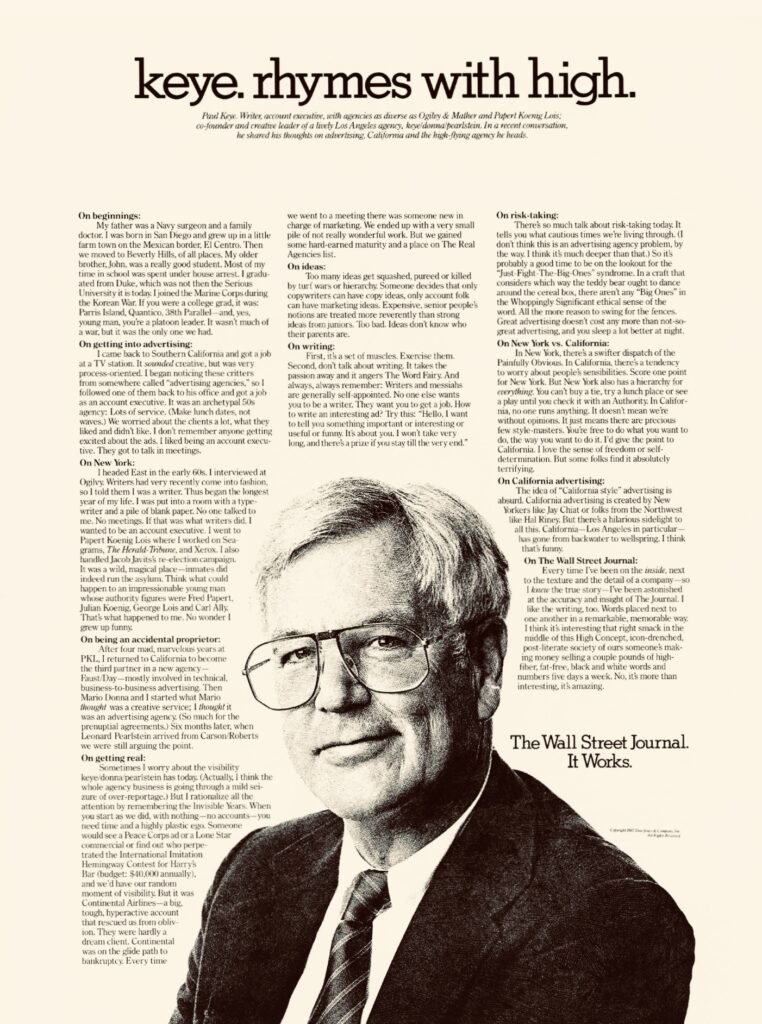I told the story of my one degree of separation from Bill Gates a few months ago. Now here’s my other one degree of separation from the world’s third richest man story.

I had an early advertising hero. His name was Paul Keye. As the headline above says, his last name rhymed with high. He was the creative director and a partner at a great little L.A. ad agency named Keye Donna Pearlstein.
Paul was a copywriter, an absolutely terrific copywriter. He had immense talent and an ego to match. He was legendary for lording that talent over lesser copywriters. And in Paul’s world, all of us were categorized as lesser. Apparently the Wall Street Journal agreed, because it featured Paul in one of its award-winning ads (above).
KDP’s offices were just a couple blocks down Wilshire Boulevard from DJMC, where I was working at my first job in advertising. I finally got up enough nerve to make an appointment to show my portfolio to Paul.
Earlier in the same week in which my appointment was scheduled, KDP had run an eight page, full-color self-promotion ad in MAC, the weekly Los Angeles advertising trade publication. It had very, very long copy but I read every word of that ad over and over again and marveled at Keye’s mastery of the language.
I arrived a few minutes early and was ushered into the Master’s office. He was, I quickly learned, a tall, disheveled, shuffling, abrupt man. He motioned me over to two facing chairs and gruffly told me to sit down in one of them. He then sat in the other one, laid my portfolio down on the floor between us, and opened it up. He hunched over and began slowly thumbing his way from one of my ads to the next. After he’d looked wordlessly at the first few selections, he peered up over the top of his eyeglasses and barked, “You’re looking at me.” It wasn’t a simple declaration. It was an accusation.
“Well,” I squeaked, “I thought maybe you might have some questions.”
“I don’t like people looking at me while I’m looking at their work.” He reached into his desk and pulled out a copy of that eight page Keye Donna Pearlstein ad I had already read and re-read so many times that week.
”Here,” he said as he thrust it toward me. “While I’m reading your stuff, why don’t you read something that’s really well written.”
It was devastating but 100% accurate. So I read those eight pages one more time and reminded myself that I was a complete copywriting amateur compared to this genius, and that I had no business showing him my meager wares.
”You’re not ready to work here yet,” he grumbled as he finished reviewing my work, ”but you might be someday. Keep working at it. Come back and see me again in another year or two.”
I closed my portfolio, picked it up off the floor, and left, completely unworried about the way he had unfavorably contrasted our talent levels, thrilled that he hadn’t thrown me out of his office, and completely inspired that he thought I might sometime in the future be worthy of merely showing him my work again.
Let’s jump ahead nearly twenty-five years. Through a strange series of events my longtime business partner and I became partners in a new ad agency. Our third partner was Leonard Pearlstein, Paul’s former partner at Keye Donna Pearlstein. I told him Paul was my writing hero, someone I worshipped as a god who walked the earth.
”What was it like to work with him every day,” I asked.
”What was it like? Oh, I’ll tell you what it was like,” Leonard responded. “We were Microsoft’s first ad agency and Bill Gates was our client before he was Bill Gates, if you know what I mean. We created Microsoft‘s very first ad and sent it up to Gates for approval, and then Paul and I flew to Seattle the next day to review the ad and take care of some other business. When we walked into Gates’ office and sat down across his desk, we could see that he had used a red marker to completely re-do the ad. There were red marks everywhere. Nothing was left untouched. Bill pushed the comp slowly across his desk toward us and said, ‘I hope you don’t mind. I’m a frustrated copywriter.’”
”No, I’m a frustrated copywriter,” Keye responded. “You’re a fucking asshole.”
”And that,” Leonard said, “was the end of our relationship with Microsoft. We could have had the biggest client in the world, but your hero called Bill Gates a fucking asshole just because the guy edited his copy. That’s what it was like to work with Paul Keye.”
I understand Leonard’s point, but subsequent events seem to have proven that Keye’s opinion of Gates was not inaccurate.
NOTE: Do yourself a favor and blow up the size of the Wall Street Journal ad at the top of this story. It is just such a pleasure to read the way Paul Keye used words and expressed his thoughts.
ANOTHER NOTE: Our agency’s Wall Street Journal rep nabbed me several poster-sized reprints of the ad at the top of this story. Years later I asked Leonard if he could get Paul to autograph one of them for me. Leonard refused. ”Don’t embarrass yourself,” he snapped. ”You’re his equal now.” Leonard was wrong. Paul was the sun and I was Pluto. I regret that I never got that autograph.
Wow, Keye had a big ego for sure. Great read. Love how you write. Best to the family.
I remember you telling me the Bill Gates story. Especially love his paragraph “on writing.”